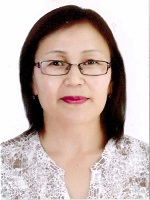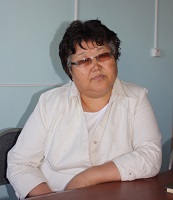Language and folklore of ethnic Tuvans in Mongolia in Tuvan electronic databases
Keywords:
database; Electronic Corpus of Texts in Tuvan Language; ‘Pisateli Tuvy’; Altai dialect of Tuvan language; language of Mongolian Tuvans; multimedia corpus; electronic educational resource; electronic library; Tuvan languageAbstract
Dialects of Tuvan language outside Tuva have reached a critical point, with the number of their elderly speakers plummeting and those from the younger generations facing problems due to language policies in the countries they live in. For ethnic Tuvans in Mongolia, this is a topical issue as well. In this article, we attempted to systematize the linguistic heritage of Mongolian Tuvans in order to prepare it for integration into the existing electronic corpora of Tuvan language. As the language spoken by Mongolian Tuvans is a dialect, there is no need for a separate project for it.
A large contribution to studying the language and culture of Mongolian Tuvans has been made by the German scholar E. Taube. The heritage of Mongolian Tuvans is a mix of published and unpublished pieces in various genres performed by a number of prominent narrators. It is also paramount to include into the collection the works of Mongolia’s best-known Tuvan writer Chinagiyn Galsan, Honored Writer of Tuva, laureate of a number of high-profile literary and public awards in Germany. Also of high importance are the works of Puntsag Dariyn, diplomat and author of a Tuvan-Spanish-English dictionary (2013).
A special place in the electronic databases should belong to dialect materials as they appear in daily broadcasts in Tuvan on state TV channel Mongolia 2; in publications by researchers at Tuva Institute for the Humanities (with G. Zolbayar as a participant); Tuvan textbooks compiled by the teachers at Tsengel Tuvan primary school; archives of the ethnolinguistic expeditions made by the department of Tuvan philology and general linguistics at Tuvan State University since the 1990s. Another recommended addition to the dialect corpus is “The Dictionary of Altai Dialect of Tuvan Language” - a collaborative project by scholars at Tuvan State University and their Mongolian Tuvan postgraduate students.
The multimedia corpus might also include audio and video recordings made by scholars from TuvSU during their expeditions. A special focus should be made on the song ‘Men Tyva Men’ (I am Tuvan) written by Tsengel Tuvans Bayan-Sagaan Ookei and later reworked by Tuvan musicians and singers into the national anthem of the Republic of Tuva (2011).
References
Galsan Chinagiin. Kto est' kto. Mongoliia seichas [online] Available at: http://person.mongolnow.com/g44.html (access data: 12.08.2016). (In Russ.)
Puntsag Dariin (2013) Tyva – Ispani – Angli sөstүү. Diccionario Tyvano - Espaῆol – Ingles / Nyvan – Spanish – English Dictionary. Ulaan-Baatar. 428 p.
Puntsag Dariin. Kto est' kto. Mongoliia seichas [online] Available at: http://person.mongolnow.com/p5.html (access date:12.08.2016). (In Russ.)
Taube, E. (1994) Skazki i predaniia altaiskikh tuvintsev. Moscow, Izdatel'skaia firma «Vostochnaia literatura». 382 p. (In Russ.)
Taube, E. (2000) Tuvinskie fol'klornye teksty s Altaia. In: Stanovlenie i razvitie nauki v Tuve. Kyzyl, RIO TyvGU. Pp. 99-101. (In Russ.)
Tsaatany — mongol'skie olenevody (2011). Youtube, 21 September [online] Available at: https://www.youtube.com/watch?v=O3HQz-q_mqQ (access date:12.09.2016). (In Russ.)
Tsaatany (2014). Youtube. 28 October [online] Available at: https://www.youtube.com/watch?v=H_6H7gHXaFE (access date:12.09.2016). (In Russ.)
Aldyn dagsha: Seӊgel tyvalarynyӊ aas chogaaly (1993), comp. Z. G. Irgit. Kyzyl, Tyvanyӊ nom үndүrer cheri. 96 p. (In Tuv.)
Baryyn Moolda Seӊgel tyvalarynyӊ yrlary (1995). Kyzyl. 49 p. (In Tuv.)
Mөӊgүn dagsha: Seӊgel tyvalarynyӊ aas chogaaly bolgash chechen chogaaly (2013), comp. U. A. Dongak. Ulaanbaatar, Kyzyl, Kitab. 263 p. (In Tuv.)
Gansukh, Kh. and Ariunaa, D. (2013) Tyva dyl 1. Ulaanbaatar. 124 p. (In Tuv.)
Gansukh, Kh., Ariunaa, D. and Odgerel, E. (2014) Tyva dyl II. Ulaanbaatar. 118 p. (In Tuv.)
Gansukh, Kh., Ariunaa, D. and Odgerel, E. (2015) Tyva dyl II. Bashkylarga nom. Ulaanbaatar. 98 p. (In Tuv.)
Gansukh, Kh., Ariunaa, D., Altanzul, S. (2016) Tyva dyl III. Ulaanbaatar. 136 p. (In Tuv.)
Taube, E. (1967) Kinderwieden im Zengel-sum (westmongolei). In: Mitteilungen des instituts für orientforschung. Band XIII. Heft 2. Berlin. (In Germ.)
Taube, E. (1974) Dac Kastrierfest bei des Tuwinern des Cengei - sum. - Asien in Vergangenheit und Gegenwart. Berlin. (In Germ.)
Taube, E. (1987) Zur traditionellen kleiding der Tuwiner des Cengel-sum // Herausgegeben vom direktor.Band XXXVI. Berlin. (In Germ.)
Taube, E. (1998) Zu zwei Ausgaben altaituwinischer lieder // Turkologie heute – Tradition und pespektive / Materialien der dritten deutschen Turkologen – Konferenz leipzig, 4-7 oktober 1994. Harrassowitz verlag wiesbaden. (In Germ.)
Published
How to Cite
Issue
Section

Author(s) license holder(s) grant rights for their work to the journal (grantee of a license) under the simple non-exclusive open license in accordance with Art. 1286.1 «Open license for a research work, work of literature or fine arts», Civil Code of the Russian Federation.
New Research of Tuva publishes articles under the Creative Commons Attribution-NonCommercial license (CC BY-NC).
Since it is an open license, author(s) reserve the right to upload the article to their institutional repository, submit it to another journal (if it allows republications), or republish it on their own website (in full, or in part).
However, several conditions apply here:
a) The republished version must always contain the name(s) and affiliation(s) of the author(s), the original title and the hyperlink to the original version on the New Research of Tuva website;
b) It must be in open access, free of charge, and no category of readers must be in any way whatsoever advantaged over general readership.
c) should the contribution be submitted elsewhere by its author(s) without substantial modification (30% or more of original text unchanged), the body of the article should contain a disclaimer that the original version was published in New Research of Tuva (with a link to the respective page)
The CC-BY-NC is a non-revocable license which applies worldwide and lasts for the duration of the work’s copyright.






